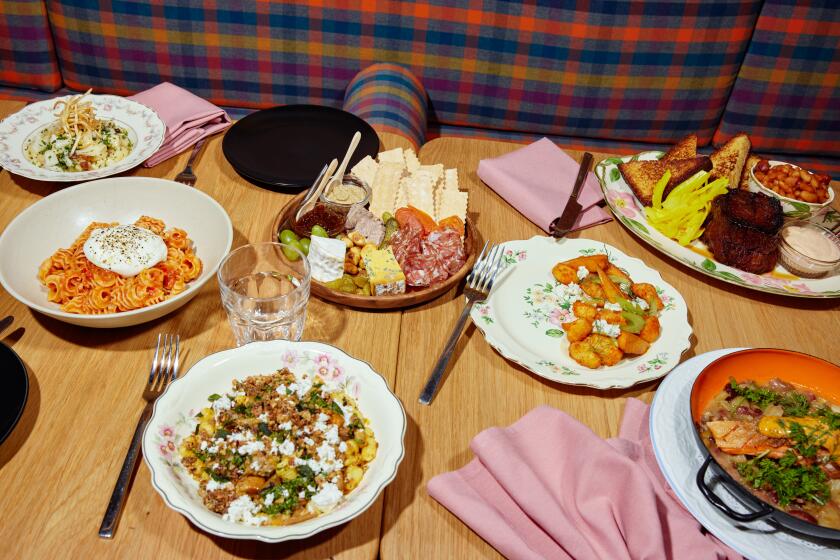Many regulatory ingredients go into food start-ups
- Share via
Find a great cook or baker, and you’ve probably found someone who has dreamed of starting a food-themed business, whether a restaurant, a bakery or even a food truck.
But the many details of starting a food business can turn the dream into a nightmare — or at least a bad stretch of insomnia.
Case in point is Kathie Kaihewalu-Fortney of Buena Park, who has gotten raves for the flavored scones that she made in her home kitchen.
But when she wanted to go commercial with the scones, she couldn’t use her kitchen to make batches to sell. To comply with regulations, Kaihewalu-Fortney used a shared commercial kitchen facility she rented by the hour.
“It’s a dream of mine to have my own place to make my scones but I can’t afford the overhead yet,” said Kaihewalu-Fortney, who started selling her Ohana Mama Scones at local arts and crafts fairs last spring.
For a recent weekend fair, she baked her pumpkin streusel scones in a space she rented at a wholesale food processing facility.
Renting commercial kitchen space was only one of the steps to getting her business up and running. Kaihewalu-Fortney had to get product liability insurance and a business license, and she had to pass a safety certification program in food handling.
She also has to get a temporary health department permit for each fair event at which she sells her baked goods.
Karen Swisher, who started her Sierra Madre Grocery Co. in January to offer bruschetta, trail mix and other items she produces, has been through the routine.
“It’s laborious,” said Swisher, whose specialty is a roasted garlic and olive salsa bruschetta. “There are just so many things, it’s like ‘Oh, I need a resale license?’”
For small businesses, it’s not always clear which health department permits are needed — even to a local health department. The licenses were generally set up with regard to facilities, not individuals renting space part time.
“We are just trying to determine where these people fit within the current structure we have,” said Denise Fennessy, assistant director of environmental health at the Orange County Health Care Agency.
She expects a decision in a few months. The agency might decide to use an existing category, such as a catering permit, or create a new one, Fennessy said.
“But we are not preventing people from doing this just because we haven’t completely finished,” she said.
Budding food businesses in Long Beach could have an easier path to launching than most. The city, one of the few in Los Angeles County to have its own health department, has been issuing commercial kitchen renters their own health department permits, said Nelson Kerr, acting manager at the city’s Bureau of Environmental Health.
“We actually changed our policy to facilitate this need, to allow multiple users to share one facility,” he said.
Pasadena, which is home to the new nonprofit Mama’s Small Business Kitchen Incubator, also will allow an individual food business working out of commercial kitchens to get a health permit, said Ronald Victor, a health inspector for the city.
Los Angeles County does not have a program to accommodate that arrangement but is aware of the need and is talking about options, said Terrance Powell, director of the Bureau of Specialized Surveillance and Enforcement at the Environmental Health division in the county Department of Public Health.
Some commercial kitchens are being used exclusively for rental projects. Chef’s Kitchens in West Los Angeles, which has several kitchens in one building, is one example. It charges part-time users $25 an hour, with a minimum charge of $200 a month. In addition, some restaurants and other food businesses are renting kitchen time to small businesses and entrepreneurs.
Mari Fassett, who founded Santa Ana-based Marimix Co. snack business in 1993, hopes to open a string of shared-kitchen facilities. She already rents space part time to some food operators, including Ohana Mama Scones, at her company’s processing facility.
By the end of the year Fassett plans to fully open CuliFlex, a shared-kitchen space in Orange that will rent space for $25 to $30 an hour. On a recent day she met with five people who wanted to start businesses selling products that included cheesecake and vegan snack bars.
Fassett said she knows firsthand of the need for shared kitchens.
“That’s my vision because I was there, looking for a kitchen when I started my company, and it was like trying to find a needle in a haystack,” she said.
More to Read
Eat your way across L.A.
Get our weekly Tasting Notes newsletter for reviews, news and more.
You may occasionally receive promotional content from the Los Angeles Times.










